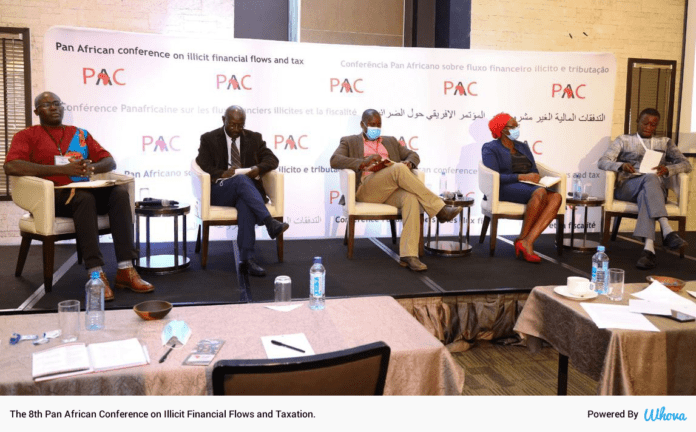Nairobi, Kenya November 19 — Civil Society Organizations (CSOs) meeting at the 8th Pan African Conference on Illicit Financial Flows and Taxation in Nairobi have expressed deep concern over African governments limited interest in the High-Level Panel on International Financial Accountability, Transparency, and Integrity for Achieving the 2030 Agenda (FACTI Panel) consultations.
They are calling on African governments to actively participate by providing written and oral input into the FACTI Panel High-Level Africa regional consultations, saying to date, only the governments of the Republic of Sudan, Egypt, Nigeria, and South Africa have confirmed participation at the ministerial level.
The FACTI Panel regional consultations seek to bring together high-level representatives from member states, along with leaders from the private sector, civil society, and academia.
The inputs from these stakeholders will feed into the FACTI Panel’s determination of technically feasible and politically viable recommendations to be made in its final report in February 2021
On 18th November, the High-Level FACTI Panel and the United Nations Economic Commission for Africa hosted the High-level Africa regional consultation to discuss possible means to address the shortcomings identified in the interim report published by the FACTI Panel on 24 September 2020.
It is only by active participation can African leaders ensure the FACTI Panel’s final report addresses the needs of African countries as losers in a rigged international finance architecture.
The FACTI Panel represents a critical institutional space to call for the implementation of measures targeted at curbing illicit financial flows and widespread tax evasion and tax avoidance that most harm countries in the Global South.
By participating in the FACTI Panel High-Level Africa Regional Consultation, African leaders can use the opportunity to critique the shortfalls of the Organisation for Economic Cooperation and Development (OECD) processes and demand the establishment of a truly inclusive and democratic global tax governance structure.
Reforming the global structure of the international financial architecture and strengthening the fiscal and policy space for socio-economic transformation were key recommendations of the PAC conference.
They also call on African governments to demand that the FACTI Panel explicitly recognizes the immediate need for a universal, intergovernmental tax body at the United Nations, where developing countries can defend and safeguard their national interests through collective action at the United Nations.
“As Africans, we are saddened with how African Ministers of Finance are taking the FACTI Panel consultations casually. This is the moment to correct an international tax system that has all along been rigged against us. We cannot afford to lose this moment!” Alvin Mosioma, Executive Director, Tax Justice Network Africa (TJNA) told Ubuntu Times in an interview.
In the face of the fundamental lesson that COVID-19 has taught governments, the centrality of public resources to Africa’s development is critical.
“We must all work towards ensuring that the FACTI Panel’s final report builds better on the Mbeki-led High-Level Panel Report on Illicit Financial Flows by clearly framing the analysis around IFFs,” added Mosioma.
According to Munir Akram, the 76th President of the United Nations Economic and Social Council, today, member states face three simultaneous global challenges. These are COVID-19 pandemic and its consequences, the realization of the 2030 Agenda and SDGs and the existential threat of climate catastrophe.
“Adequate financing is key to addressing each one of these challenges. Such financing will have to be mobilized at both the national and international levels. The ability of developing countries to mob dome finance is obviously constrained and this capacity has further diminished due to the impact of Covid-19,” Munir highlighted.
To allow illicit flows to continue at this time, he adds, would be nothing short of criminal. IFFs deny vulnerable people access to basic services and infrastructure and condemn them to a life of inequality and poverty.
To ensure African governments build back better and sustainably post COVID-19, the CSOs called on African governments to ensure the creation of a truly inclusive architecture of international tax cooperation to end IFFs.
IFFs deny governments billions of dollars that would otherwise be invested in public services particularly health, education, and social protection.
African civil societies hosted the 8th Pan African Conference (PAC) on Illicit Financial Flows (IFFs) and Taxation from 9-13 November 2020 whose theme was ‘Africa We Want Post COVID-19: Optimizing Domestic Resource Mobilization from the Extractive Sector for Africa’s Transformation.’
Trust Africa organized the 8th PAC in collaboration with 18 co-conveners, including Tax Justice Network Africa (TJNA), African Union (AU), United Nations Economic Commission on Africa (UNECA), Global Alliance for Tax Justice (GATJ), African Tax Administration Forum (ATAF), OXFAM, Action Aid among others.

